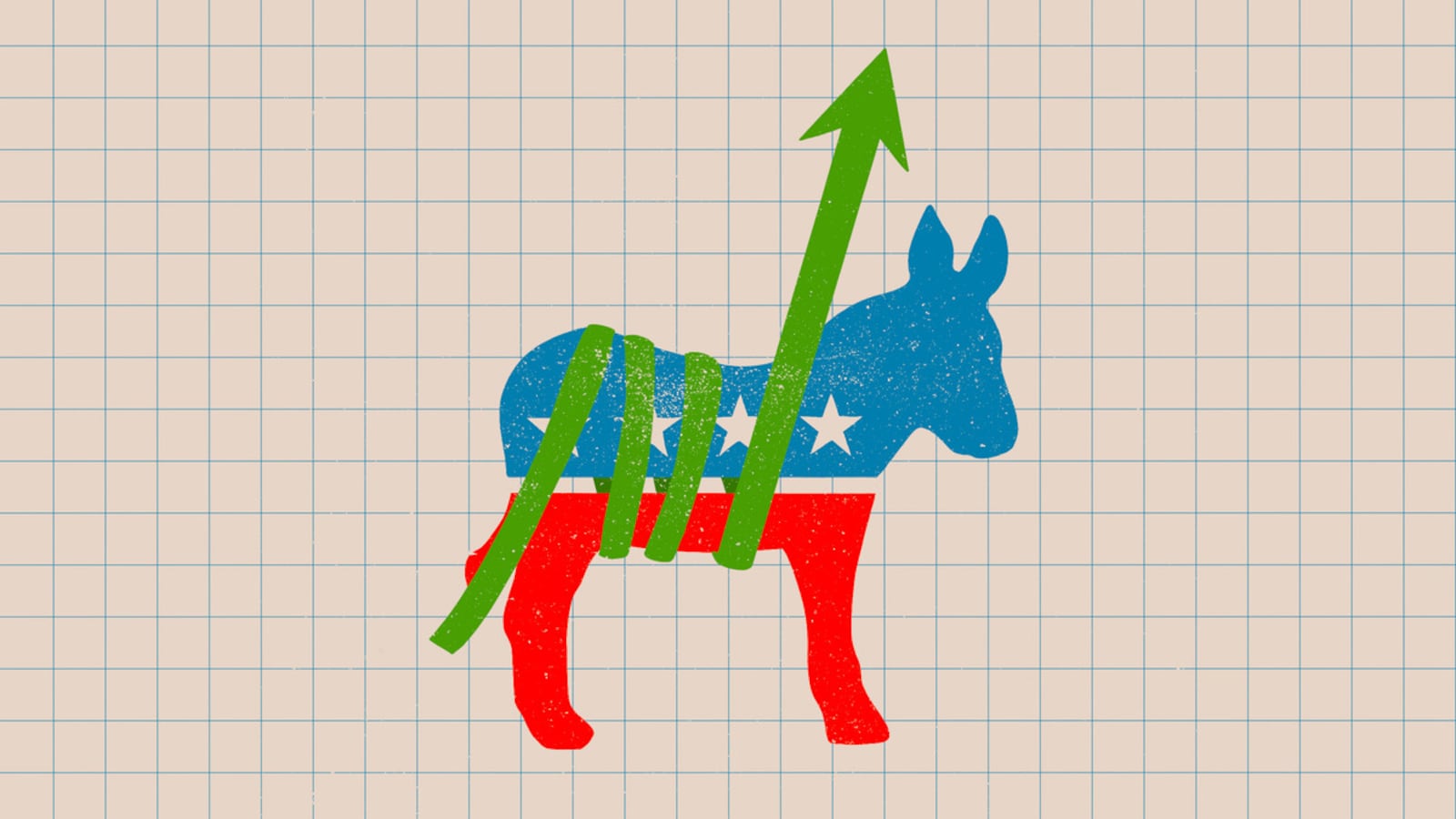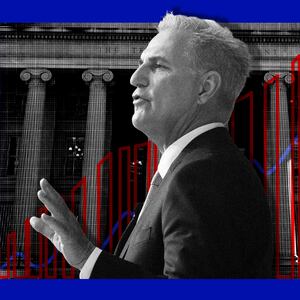On the brink of voting for a bipartisan deal to avert a devastating economic collapse, Democrats appear to have a deliberate strategy: keep it cool.
Don’t gloat. Don’t brand the compromise legislation as a win. Don’t brag about the spending cuts and policy changes Republicans failed to squeeze in, even as they held the U.S. economy hostage in order to succeed.
For Democratic lawmakers, that essential task isn't hard. Very few, if any, view the bill—which raises the government’s debt limit in exchange for spending cuts and other GOP priorities—as a complete win. Plenty are still steaming about the fact that President Joe Biden negotiated in the first place.
But many Democrats—even those who have been most vocally upset about the process and might still vote no on the bill—are having a hard time resisting the urge to stick it to Speaker Kevin McCarthy (R-CA).
After making lofty promises to his party to secure deep spending cuts and claw back Biden’s legislative achievements, McCarthy is facing internal heat for falling short. Dozens of GOP lawmakers are promising to vote against the bill; several are openly blaming McCarthy for capitulating to the White House.
But if Democrats are going to grin and bear a vote on this compromise legislation, McCarthy’s predicament is giving them at least a little reason to smile as well.
Progressives, like Rep. Greg Casar (D-TX) said McCarthy came out looking “like a total fool” after his talks with Biden, even though he is leaning no on the bill; Rep. Jamaal Bowman (D-NY), who is undecided, said the president “kicked McCarthy's butt.”
“It’s hard to put a positive spin on basically a hostage situation,” said Rep. Dan Kildee (D-MI), before essentially proceeding to do just that. “I wouldn’t want Kevin McCarthy negotiating for me, that’s for sure,” he said.
“We had to give something to get out,” Kildee added, “but we didn't have to give as much as what we would have otherwise given.”
As Rep. Jamaal Bowman (D-NY) put it, Biden was inevitably in a “lose-lose” situation “once Republicans decided to hold the debt limit hostage and the global economy hostage.” The progressive pointed to provisions on increased work requirements for social welfare programs as a letdown.
“Biden was in a tough situation,” Bowman admitted. “And you know, he made the best of it.”

Other Democrats, however, were not in the mood to credit the White House, even if Republicans are openly lamenting getting rolled by Biden.
Rep. Jared Huffman (D-CA), a progressive who is undecided on the bill, said colleagues he spoke with were “pretty disgusted” about how the process unfolded, what it produced, and the precedent it set.
“I’m not convinced by this narrative that we should celebrate it not being a lot worse, that we should be doing high fives because the White House didn’t capitulate on more of their demands,” Huffman told The Daily Beast.
“Many of us feel that the White House didn’t play its hand very well in entering into this negotiation and undermining the validity of alternatives that could have avoided a default,” he continued. “That was just a dumb idea.”
Still, the deal itself isn’t remarkably ambitious for either side. It would suspend the debt ceiling for two years—in effect raising the debt ceiling by about $3.5 trillion—while essentially locking in non-defense spending at current levels. The Congressional Budget Office estimated Tuesday night that the modest deal would actually save nearly $1.5 trillion over the next decade by setting budget caps for the next two years—unless Congress comes to a new agreement—and instituting work requirements on people between the ages of 50 and 54 who are receiving food benefits. (The CBO actually projected that food assistance programs would cost more because the bill makes it easier for veterans and the homeless to receive those benefits.)
While the effects of the legislation sound significant, the reality is that actual spending would only be affected by about $55 billion next year and $81 billion the year after, according to The New York Times. Meanwhile, Congress would set itself up to spend about $900 billion on defense and $700 billion for non-defense programs for each of the next two years.
Although Democrats are unhappy they’re paying any sort of price for a debt limit increase, the compromise is far from the House GOP’s initial offer, which would have cut $4.8 trillion over a decade, according to the CBO, by targeting a number of progressive priorities.
But even if some progressives aren’t thrilled with the overall agreement, there’s a broader reason Democrats might be reluctant to spike the football too early: not upsetting a delicate legislative process that is far from a lock, with just days to go before the federal government defaults on its debt.
The president admitted as much on Monday, telling reporters, “I hear you guys saying, ‘Why didn’t Biden say what a good deal it is? Why wouldn’t Biden say what a good deal it is before the vote?’ You think that’s going to help me get it passed? No.”
An offhand remark from Biden economic adviser Bharat Ramamurti unintentionally demonstrated his boss’ point. In a Tuesday interview on CNN, Ramamurti argued the deal “locked in” the progressive accomplishments of Biden’s first term—which conservative lawmakers widely shared, holding it up as their best argument yet to block the deal.
“This should tell you a ton about how bad this 4 trillion $ deal is,” wrote Rep. Eli Crane (R-AZ), a hard-right conservative who opposes the legislation.
Rep. Anna Paulina Luna (R-FL), meanwhile, quote-tweeted the clip with a slew of red-flag emojis.
Many Democratic lawmakers have not weighed in on the deal or, if they have, they preferred to focus on the detriments of GOP hostage-taking and the necessity of averting a default.
Official messaging guidance from the Democratic caucus, sent out on Monday, encouraged members to argue Democrats are working to avoid default while Republicans are risking it to extract spending cuts. One potential talking point, however, was that the deal “rejects Republicans’ extreme demands to cut critical lifelines for everyday Americans.”
Heading into Wednesday’s critical vote, McCarthy has already lost dozens of critical Republican votes. On Tuesday, he spent a late-night conference meeting working to sway members who were on the fence or already defecting that he hadn’t, in fact, given away too much.
Those numbers leave McCarthy counting on the support of at least a couple dozen Democrats to save the package. Although some progressives have offered generous assessments of Biden’s negotiating skills Tuesday, they still remain the most likely defectors.
Jayapal, the Congressional Progressive Caucus Chair, said on Tuesday that a large portion of her caucus has concerns over the deal, mainly including the work-requirement provisions. CPC leadership as of Tuesday was conducting a whip count—essentially a tally of how many members were for and against the bill—but the results of that process weren’t yet completed.
“It's important that people understand that there are impacts to this and they are negative,” Jayapal told The Daily Beast. “And they were gotten in the context of a hostage-taking situation of using a constitutional obligation to get things through that will hurt people across this country.”
The Senate, meanwhile, is lying in wait for something they can actually vote on. Many Democrats Tuesday remained mum about whether or not they plan to support the current deal.
The Treasury has signaled a default could come as early as June 5. As the clock ticks, even Democrats who don’t like the deal are preparing to swallow it, for the sake of avoiding something worse.
“I will say, I don’t think anyone feels that Republicans scored a big home run here,” Huffman said.









